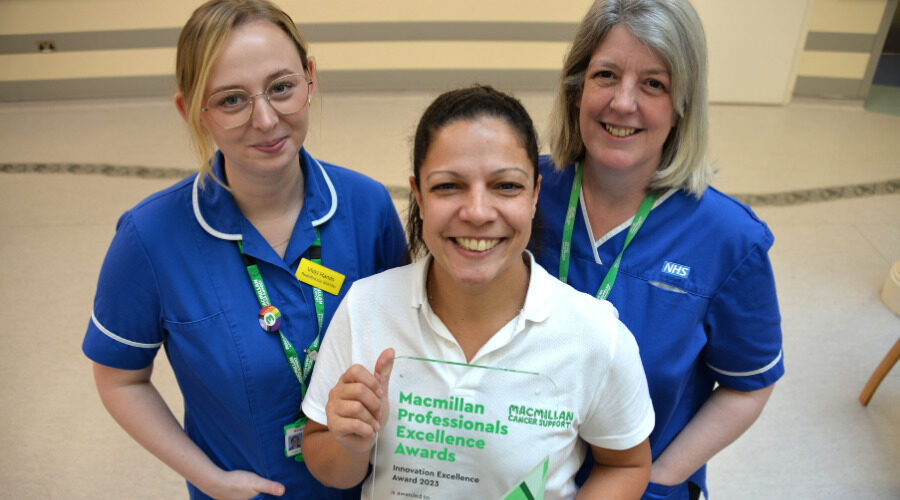
Spotlight
Award winning service helps patients with late effects from radiotherapy
Patients treated for cancer in Somerset are benefitting from an award-winning clinical service that provides continued support in the months and years after radiotherapy treatment.
The Macmillan Radiotherapy Late Effects service provides specialist advice, support and management for people who are experiencing ongoing effects from radiotherapy.
The service was initially pioneered at Musgrove Park Hospital in 2014 but has since grown to offer clinics at Yeovil District Hospital and Bridgwater Community Hospital.
Radiotherapy is a highly effective treatment for many types of cancer, but it can cause physical or psychological late effects for people, sometimes months or years after their treatment has been completed.
The support provided by the service ranges from lifestyle changes and self-management, through to prescribing medications, and referrals to specialist regional and national services.
Patients may be referred to counselling or programmes of exercise, including swimming and other activities to improve function and sleep.
The late effects team has grown and now leads a new regional service in a partnership between Macmillan Cancer Support, the Somerset, Wiltshire, Avon and Gloucestershire Cancer Alliance – also known as ‘SWAG’, and radiotherapy services across the South West region.
This work was recognised with a prestigious Macmillan Professionals Award for Innovation Excellence in November 2023.
The partnership is initially a two year project that will see radiotherapy late effects services develop a network of support at four radiotherapy centres in the areas that made up the SWAG Cancer Alliance – the Beacon Centre at Musgrove Park Hospital, Royal United Hospital in Bath, Cheltenham General Hospital, and Bristol Haematology and Oncology Centre. The team also provides mentorship, developing further services at hospitals in Exeter, Torbay and Truro.
It’s the first project of this kind in the UK, where all the NHS trusts in a cancer alliance have worked with Macmillan to give patients across a region the same level of support.
It will provide equity of care across the south west and help to inform the long-term future of a radiotherapy late effects services.
Lisa Durrant, our Macmillan consultant therapeutic radiographer for late effects, said: “While radiotherapy is a life-saving cancer treatment, the patients who receive it can develop late side effects that can be life-long and life-changing.
“This award recognises the work done by all members of the regional team, but most importantly it raises awareness about late effects and ensures our patients continue to be supported to thrive even decades after their treatment is completed.”
Christine Pike is one of the patients from Somerset who’s benefited from our radiotherapy late effects service. “Following my cervical cancer surgery and intensive radiotherapy treatment, I worked hard to return to normal fitness, but after the first three months of recovery, late effects of the treatment began to take hold,” she says.
"Whilst I was delighted that the cancer was in remission, I was struggling with a fragile pelvis as well as abdominal muscle and nerve damage…the symptoms were life changing.
“The referral made to the late effects team at the Beacon Centre at Musgrove Park Hospital by my oncology surgeon was a salvation.
“From that moment, the late effects radiographer Lisa Durrant has guided me towards achieving goals of independence and a fulfilling lifestyle.
“Not only has she arranged numerous appointments for me over three years (including those for bowel, bladder, and bone strengthening, as well as continuing lymphedema and physiotherapy), but her emotional support is hard to quantify.
“At one point I discovered a new lump, and after a lapse of nearly a week when I failed to share my concerns with anyone, I contacted Lisa. Her guidance via email broke the ice enough for me to visit my GP and a quick diagnosis of a false alarm followed. It feels as though my late effects team has simply kept me going.”
Shelley Orton, Macmillan’s strategic partnership manager, said: “This is a real step forward in personalised cancer care. We’re so pleased to have worked with the cancer alliance to fill this gap in support for people who are often struggling from life-changing effects caused by cancer treatment.”

